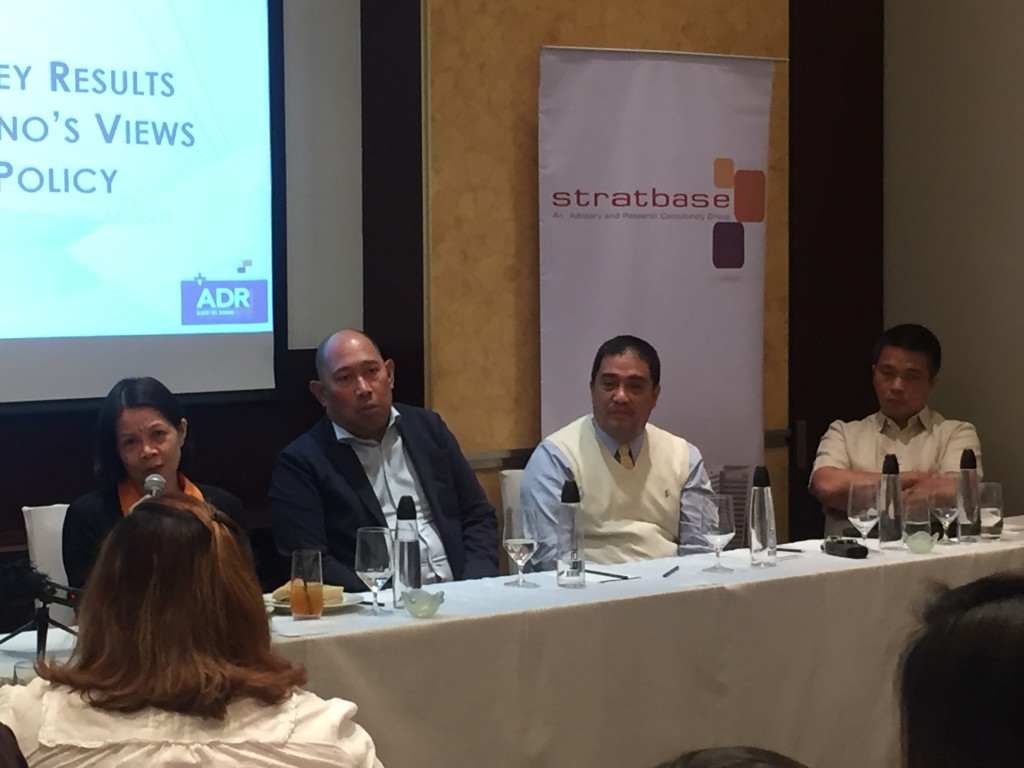Disconnect? Duterte admin foreign policy vs. public sentiment

Pulse Asia presents survey on Filipinos’ views on foreign policy at Fairmont Hotel in Makati. (L-R) Resource persons invited are Pulse Asia’s Ana Tabunda, ADRI President Dindo Manhit, DLSU International Studies professor Renato de Castro, and UP Institute of Maritime Affairs and the Law of the Sea director Jay Batongbacal. KRISTINE SABILLO/INQUIRER.net
A foreign relations analyst on Friday said there seems to be a “disconnect” in the government’s foreign policy and the sentiment of the public.
Renato de Castro, international studies professor at De La Salle University, said the results of a recent Pulse Asia survey show that “there is disconnect between the administration effort to come out with an independent foreign policy vis-a-vis the sentiment of the Filipino people.”
De Castro was one of the experts invited to react to the results of a Pulse Asia survey commissioned by private think tank Stratbase ADR Institute (ADRI).
The survey showed that 84 percent of Filipinos want the government to assert its rights on West Philippine Sea, an area claimed by both Philippines and China. The survey was conducted in December 2016, after President Rodrigo Duterte said the government will “not insist now” on the country’s claims.
READ: Duterte on South China Sea claims: We won’t insist now
The survey also showed that not a lot of people agree (47 percent) with having security and defense cooperation with China and Russia. This is amid Duterte considering buying weapons from Russia instead of long-time ally US.
The presentation of Pulse Asia included an earlier released survey on trust ratings of countries dealing with the Philippines.
READ ABOUT SURVEY: 8 in 10 Filipinos want PH to assert rights in South China Sea—Pulse Asia
“The survey tells us that there is still large trust in terms of our traditional allies, in terms of the United States and Japan,” De Castro said. “There is still a distrust vis-a-vis China.”
He said the public should be consulted on foreign affairs because they pay for the salaries of diplomats and budgets for defense and foreign relation events.
“When President Duterte announced last October that we would have to cross the Rubicon, were the people consulted if we have to cross the Rubicon? Because first and foremost it’s they who have to pay for the consequences,” De Castro said.
He explained that support of the public is also a “reflection of legitimacy.”
“If you don’t have the support of the people, countries that interact with you would have second thoughts,” he said.
According to him, it is one of the reasons why Russia and China were reluctant in having a strategic alliance with the Philippines.
“Russia and China both said no. ‘We will settle for economic alliance,’” he said.
De Castro said it will also be a matter of sustainability. “If you do not have the support of the people, how will you sustain this foreign policy initiative?”
What foreign policy?
On the other hand, Jay Batongbacal, director of the Institute of Maritime Affairs and the Law of the Sea, pointed to another survey result, which listed foreign policy or territorial integrity as ranking low in Filipinos urgent national issues.
READ: Survey: Health a major concern of most Pinoys
“The public is not as attached to foreign policy,” Batongbacal said, explaining that they are only interested if the outcome impacts them.
Pulse Asia’s Director for Research Ana Tabunda agreed that “foreign policy issues are not close to the gut.”
Batongbacal said there were things that were not captured in the survey.
Nevertheless, he said the survey clearly shows that they “continue to support what the previous administration did (regarding West Philippine Sea) and would like to see that that effort produce the results that we expected.”
“What we do not see right now if the public is satisfied with what is happening,” he added.
Batongbacal also pointed out that the results still show that people are “open to exploring cooperation” with China and Russia.
However, he said the bigger concern is that the “pivot” to China is becoming more a “pirouette” as the government flip flops on issues.
“Last year we were so anti-US. Now all of a sudden it’s still on. Is it changing next month?” he said.
De Castro said that the Duterte administration has no clear-cut foreign policy.
“What we consider now as foreign policy is de facto reaction,” he said. “What are the priorities?What are our national interests? Current foreign policy is not in terms of pronouncement but in terms of reaction.” JE














